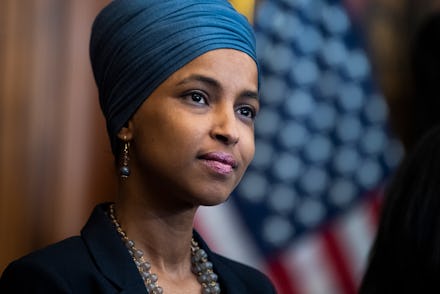Democrats want the State Department to "recognize Islamophobia," whatever that might mean

In recent years, Islamophobia across the world has continued to rise through not only individual incidents, but global policy as well. Despite all of its talk about religious liberty, the United States is no exception to this. Some politicians are hoping to create change though. This week, a group of Democratic lawmakers led by Rep. Ilhan Omar (Minn.) called for an envoy to combat Islamophobia, and monitor it as well.
As one of only three Muslims in Congress, Omar is no stranger to Islamophobia. Reactions to Omar, however, are often driven by the fact that she's not only Muslim but also a Black woman. Time and time again, other politicians have directed their vitriol at Omar, including falsely accusing her of antisemitism, and she was a popular target of former President Donald Trump, who often targeted Omar for being a Somali refugee.
With this in mind, it's no surprise to hear that Omar is leading the charge for an envoy to address Islamophobia. On Tuesday, Omar co-wrote a letter to Secretary of State Antony Blinken along with Rep. Jan Schakowsky (D-Ill.). For their letter, Omar and Schakowsky were joined by 23 other Democratic representatives, including Reps. Karen Bass of California, Jim McGovern of Massachusetts, Rashida Tlaib of Michigan, Adam Smith of Washington, and Sara Jacobs of California.
Per CNN, the group's letter wants Blinken to create an envoy similar to the one developed by the Department of State to address antisemitism. The lawmakers wrote, "As part of our commitment to international religious freedom and human rights, we must recognize Islamophobia as a pattern that is repeating in nearly every corner of the globe. It is past time for the United States to stand firmly in favor of religious freedom for all, and to give the global problem of Islamophobia the attention and prioritization it deserves."
The Hill reported that lawmakers specifically noted that along with state-sponsored Islamophobic policies, "We have seen a disturbing rise in incidents of Islamophobic violence committed by individuals connected to larger transnational white supremacist networks, including but by no means limited to the mosque shooting in Christchurch, New Zealand, in 2019 and the recent murder of a Muslim Canadian family in London, Ontario."
Lawmakers additionally want Blinken to include state-sponsored Islamophobia as a topic in the State Department's next human rights report. To show why the envoy is necessary, lawmakers specifically cited a 2021 annual report from the United States Commission on International Religious Freedom which found that China, India, and Burma had "patterns of mistreatment and human rights violations against either their entire Muslim populations or particular sects of Muslims."
In a statement, USCIRF's vice chair Anurima Bhargava said the report shows "intensified religious persecution and violence during the global pandemic." Bhargava added that the organization recommends the Biden administration "should immediately increase the annual ceiling for refugees; and definitively and publicly conclude that the atrocities committed against the Rohingya people by the Burmese military constitute genocide and take action accordingly; as the State Department recently determined regarding China's genocide against Uyghur and other Turkic Muslims.”
USCIRF isn't the only organization documenting Islamophobia. The Council on American-Islamic Relations also found an increase in Islamophobic hate crimes, per CNN, and the United Nations Human Rights Council additionally issued a report on rising Islamophobia that specifically called out the United States.
While developing an envoy to respond to Islamophobia sounds good, it's unclear what that really means. Would the U.S. utilize this envoy to excuse foreign intervention while failing to turn an eye inward? After all, the U.S. routinely discriminates against Muslims. For example, the U.N.'s report noted that the U.S.'s Controlled Application Review and Resolution Program was applied to immigrants from "Arab, Middle-Eastern and South-Asian countries" in a manner that discriminated against Muslims.
Beyond that, Muslim communities in the U.S. are subject to routine surveillance. Currently, the Biden administration is revamping Countering Violent Extremism, a surveillance program created under former President Barack Obama that evolved into Trump's Targeted Violence and Terrorism Prevention. Although Islamophobia certainly needs to be addressed at a global level, it's hard to imagine the U.S. government would do any meaningful work to address the ways it has contributed to this rise.